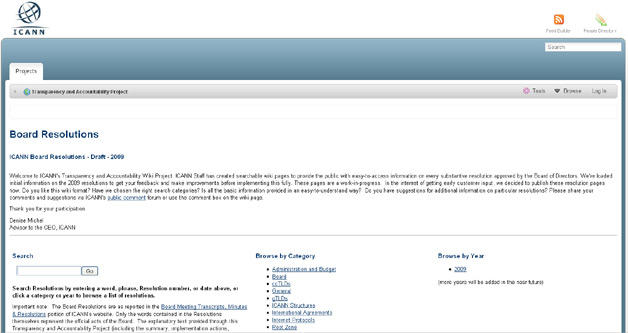The Interactive Advertising Bureau (IAB) is speaking out against ICANN’s decision to open the domain name floodgates by lifting restrictions on generic top-level domains.
Are the new domains a good idea? Tell us what you think.
ICANN is to start accepting applications for new gTLDs on January 12, 2012. The application period will run until April. They’re expected to roll out late next year.
The IAB, however, is calling on ICANN to withdraw this plan, saying it will cause “incalculable financial damage to brand owners, including the hundreds of media brands in its membership.”
The plan would allow brands to apply for domains that end in their name. Like “.webpronews” or “.pepsi” and so on. However, it would also open the door for cyber squatting, according to the IAB, as well as include what the organization calls “exorbitant fees for web publishers and brand marketers.”
The plan, the IAB says, would “come at an extremely high cost to publishers and advertisers, and would also offer ‘cyber squatters’ an opportunity to harm a brand’s integrity and/or profit greatly from their bad-faith domain registrations.”
IAB President and CEO Randall Rothenberg said, “ICANN’s potentially momentous change seems to have been made in a top-down star chamber. There appears to have been no economic impact research, no full and open stakeholder discussions, and little concern for the delicate balance of the Internet ecosystem. This could be disastrous for the media brand owners we represent and the brand owners with which they work. We hope that ICANN will reconsider both this ill-considered decision and the process by which it was reached.”
The IAB today called on ICANN to withdraw its controversial new domain-naming plan. Why their plan could be disastrous to media brand owners: http://ow.ly/63vMs
The IAB’s words follow a similar campaign from the Association of National Advertisers (ANA). Earlier this month, ANA President and CEO Robert Liodice published a letter to ICANN President Rod Beckstrom outlining the organization’s concerns. In the letter, he says the plan is economically unsupportable, and likely to cause irreparable harm and damage.”
The ANA is made up up over 400 companies, which represent over 10,000 brands.
“At the same time, the Program contravenes the legal rights of brand owners and jeopardizes the safety of consumers,” the letter continued. “By introducing confusion into the marketplace and increasing the likelihood of cybersquatting and other malicious conduct, the Program diminishes the power of trademarks to serve as strong, accurate and reliable symbols of source and quality in the marketplace. Brand confusion, dilution, and other abuse also poses risks of cyber predator harms, consumer privacy violations, identity theft, and cyber security breaches. The decision to go forward with the Program also clearly violates sound public policy and constitutes a breach of ICANN’s own Code of Conduct and its undertakings with the United States Department of Commerce as most recently embodied in the Affirmation of Commitments.”
You can read it in its entirety here. Its a 9-page document.
Are these concerns overblown?
Sean Callahan at BtoB quotes Forrester Research analyst Jeff Ernst as saying, “It is too early to tell how big the malicious threat is. $185,000 is a lot of money to spend for a cybersquatter compared to a $10 dot-com domain name at GoDaddy.”
Beckstrom responded to Liodice’s letter, saying, “The June 2011 decision to proceed with the program followed six years of inclusive policy development and implementation planning,” and “One clear directive of the consensus policy advice on which the program is built is that TLDs should not infringe the existing legal rights of others. The objection process and other safeguards eliminate the need for ‘defensive’ gTLD applications because, where an infringement of legal rights can be established using these processes, an application will not be approved.”
Liodice responded to the response, saying, “We are not surprised by ICANN’s response although disappointed that ICANN chose to defend its process and deny any doubt as to consensus. Rather, ICANN needs to respond to the real concern from the brand owner community. There is no question that this Program will increase brand owners’ costs by billions of dollars. We should not be debating if 40 or 45 comment periods were held; instead, ICANN should be justifying its economic analysis regarding the Program against the staggering costs to brands. ANA welcomes further discussions and an opportunity for further economic study to quantify the need for more TLDs and what it will mean for industry and other stakeholders, such as the public interest community who will face the same brand dilution concerns.”
ANA’s General Counsel Doug Wood of Reed Smith LLP added, “Now is not the time for either side to ‘dig in its heels’ much less defend the process, especially in a depressed economy. ANA has raised real concerns regarding economic losses, brand dilution and resultant privacy / cyber-security harms. In light of our shared goals of a safe and stable global Internet, ICANN should return to the negotiating table and work with all concerned parties, including the ANA and its members, to resolve brand owners’ legitimate concerns in a manner consistent with ICANN’s consensus obligations.”
What do you think? Do you have concerns over ICANN’s plan or are these organizations overreacting? Share your thoughts.

 The RIAA is lowering its horns and taking the .music initiative head-on. Even though the .music domain extension hasn’t seen the light of day yet, the RIAA is already challenging ICANN to ensure that, if approved, this top-level domain won’t be used to encourage music piracy. The RIAA would like to work closely with ICANN and others to "ensure that best practices are developed and used to ensure this type of malicious behavior does not occur."
The RIAA is lowering its horns and taking the .music initiative head-on. Even though the .music domain extension hasn’t seen the light of day yet, the RIAA is already challenging ICANN to ensure that, if approved, this top-level domain won’t be used to encourage music piracy. The RIAA would like to work closely with ICANN and others to "ensure that best practices are developed and used to ensure this type of malicious behavior does not occur." 

